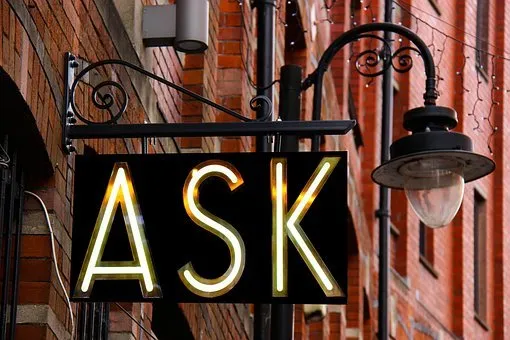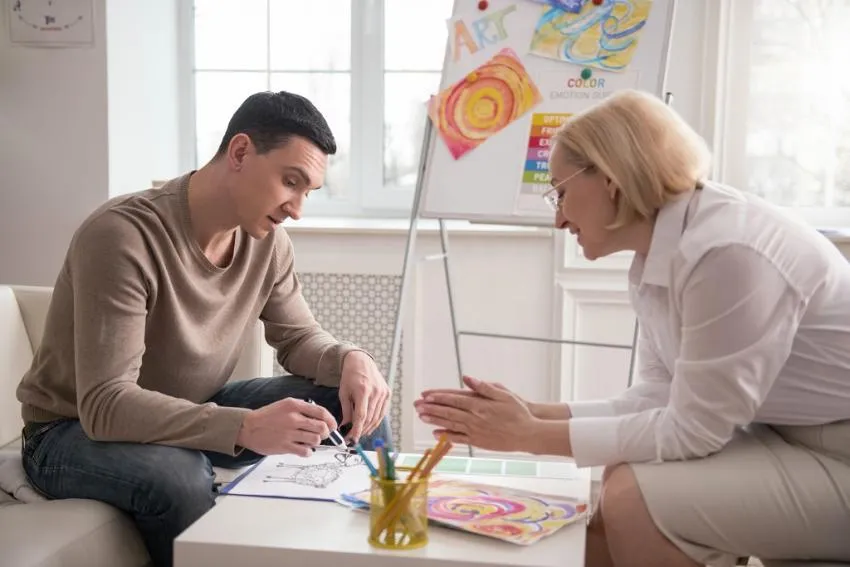10 Signs Your Therapist Is Right For You
So, you've done the difficult step. You've found a therapist and for a couple of sessions you've been pouring out your feelings and, hopefully, making progress.
But perhaps, you're not sure if your therapist is really a good one. Especially, if you've no previous experience or knowledge to compare it to.
Worry not, the flags are easy to spot if you know what to look for. Here are some signs your therapist is right for you.
1. You feel comfortable when your therapist is around

One of the steps to any successful therapy is comfort. Unless you've massive trust issues, which are the reasons you're going to therapy, you'll probably feel safe during the sessions.
Therapists will let you know what to expect from your sessions on the first day. They should lead with humility and have enough skill under their belt to make you feel at ease and comfortable. Be it using special tactics to approach you or even lighting a candle with a soothing scent.
However, trusting your counsellor is crucial for you to make progress. You can't have a functional relationship with anyone if you don't let them in.
This doesn't mean you'll feel comfortable from day one, it will take a while. But if you always have a feeling that something isn't right, perhaps, listen to your gut.
It goes without saying you should be careful who you put your trust in. So, if your therapist is keeping a distance and doesn't bother to let you in, perhaps, that's a sign they're not a very good one, to begin with.
2. They tailor an individual approach

Therapy isn't a one-size-fits-all experience. Treatment that's perfect for one person doesn't necessarily mean it'll work just as well for a second one.
If anything, an unsuitable approach can be damaging to you. This is why a good therapist will be grateful if you tell them you'd like to try a different treatment.
Most therapists will use the cognitive behavioural approach (CBT) as it's the most common and effective one. It boasts as much as a 75% success rate, so it's easy to see why this is a favoured one.
However, if you suggest trying a new approach and you receive defensiveness as a response then that's a big red flag. Trying out new treatments that will best suit you is all part of therapy.
That's why your counsellor should be willing to experiment with what works best for you. Even if you tell them you'd rather find a new therapist, they should be thankful for this communication. It benefits neither you nor them for you to stay with a counsellor that can't help you.
There are tons of approaches to try out from, so don't let your therapist tell you there's only so much they can do. Other than CBT you could try Gestalt therapy, art or music therapy, holistic approaches, the list goes on.
But don't fret, figuring out what works best for you isn't solely up to you. Your therapist should be able to tell what would be a suitable approach for you personally.
Perhaps, it's a matter of time until they'll suggest a different treatment during a session. Don't forget, it's about working together, not letting one side do all the work.
3. They don't give too much advice

This might come off as a big surprise, mainly because this is what most clients seek: advice. But that's not a therapist's role, if anything the less they give the better.
This is because they might interpret your situation differently than what it actually is. Especially if you might not be telling the full story or if, at a certain point, you've come to miscommunication due to simple human error.
But also, if they give you direct advice they're doing the work for you instead of teaching you how to solve a problem. It's like a math teacher getting tired of explaining how things work and doing your homework for you.
Will you learn something from that? Yes. That if you sit still and wait long enough, the professional will do all the hard work.
Much rather, like in the above image, a good therapist will ask if you want advice. So, don't write them off as poorly educated professionals if one day they'll calmly ask "is there anything I can help with" or "would you like some advice".
I'll be honest, I'm one of the people who'd like advice if I open up to my counsellor. I know it can definitely be frustrating to not receive it after hours of sessions.
But sometimes, even asking for advice may push the progress further. As they say, never hurts to ask, but don't expect an answer you want to hear.
4. They respect your boundaries

This comes as a given, but it may not be clear to those who've had nothing but people breaking boundaries in their lives. Emotional abuse might make someone believe that breaking one's boundaries is an inevitable part of life. Especially if this is something that's been going on throughout one's interactions with various people.
However, it's the exact opposite. When someone breaks your boundaries, you may want to consider if you want this person in your life.
Therapists are no exception. They must respect your boundaries, even if they need more information from you to make an assessment.
But this applies to the client as well. You should respect your therapist's boundaries. As the good old saying goes "yes is yes and no means no".
So what may be some of the boundaries to expect in a session? The sessions must be held in an agreed setting during specific hours that you both consent to, nobody but you and the professional should be present unless you're in for couples or group counselling.
Touch, gifts, and out-of-session contact (i.e. catching up, or adding them on social media) that doesn't include therapy should be avoided. This is because your therapist is a human being and they've their own lives outside of the office.
They're not going to be the same person and they may behave differently. Just like you. You wouldn't act the same way with a therapist as you would in front of your closest friends or family members. It's important for both sides to remember and respect that simple fact.
While I was doing my degree in clinical psychology many professors have told stories of where they had to sit in silence with their clients throughout the whole session. Because the client didn't want to communicate.
Of course, there were gentle mentions of "you'd help me help you if you've told me something" which was in vain. However, after several sessions of sitting in silence, the client finally decided to speak.
That's because their client realized they're in a safe space, simply because the counsellor didn't break their boundary and didn't force them to speak. Respecting one's boundaries doesn't need to carry such an extreme character as in the above example.
But if you tell your therapist you don't want to talk about a subject, they should respect it and find a different way to progress. It's all part of communication. Speaking of which.
5. They're a good communicator

A good therapist knows how to approach a customer because communication is the basis of therapy. Naturally, no one's perfect, and sometimes they may make a mistake, but most of the time they should know how to deal with their client.
Communication in a therapeutic setting is important because it helps create a safe space and gain a client's trust. When it's done well, it helps clients feel heard and have their emotional well-being taken care of.
Think of those bad sessions when you end up crying. It's the therapist's communication that helps you get back on track and feel comforted.
Good therapists will take both your verbal and non-verbal cues into consideration to tell what you're experiencing and how to further guide the conversation. They know communication needs to be clear, concise, concrete, correct, coherent, complete, and courteous.
You might want to watch out for communication blockers and boosters to assess your therapist's skill. Blockers are things like interrupting, quick reassurances such as "don't worry about that", patronising, digging for information, preaching, and advising.
Communication boosters are things like paying attention, reflecting on what you've said, and summarising it back to you to ensure they've understood you correctly. As well as validating the value of what you're saying using phrases as "I hear you" or "I appreciate that".
Finally, they'll encourage you to communicate your feelings in a positive manner. This is done by using "I" statements such as "I feel __ when I __".
However, they'll actively listen way more than speak. This is because in therapy you've your chance to tell your therapist all about what's going on in your life and hence give them tools to help you.
They'll be able to explain more clearly what's happening with your issues and repeat back what you've said to them in a way that helps you reflect on previous experiences. For example, if you tell your counsellor that your partner's constantly twisting your words around and keeps you from doing what you like your therapist may point out they're being manipulative and controlling.
That was a very simple example, but this is a therapist's job, to point out small things you may overlook or that may not be too obvious. But they won't leave it at that and check back in with you to ask about any changes or progress that's been made since the last time you've spoken.
The therapist will make you feel at ease to come back to a previous topic and help you work on things at your own pace. Many first-time clients are scared to seek counselling because they don't know what to say.
But don't worry, the therapist will help you out and they'll be the ones to coax answers out of you when you're having trouble. But they'll do so at your pace and comfort, which brings us to our next point.
6. They don't rush

This point has been brought up time and time again: therapy is about you. You're the one making progress, so there's no point rushing.
At the start of your treatment, you'll be asked what you hope to achieve and how soon ideally you'll achieve that. Your counsellor will probably tell you if you've set the timeline to be too narrow, but it doesn't mean what you want to reach is unachievable.
It simply means you'll unwillingly end up rushing through the treatment and that's not what any good therapist wants. Instead, they'd rather you took your time figuring out what's right for you and make progress at your own pace.
They'll also regularly re-assess your goals after some time to see how close you are to reaching them. It'll be a learning curve rather than a marathon.
If you need to slow down and go over certain points, a good therapist will recommend you to do just that. But if there's a chance to pick up the pace they'll be willing to do that as long as you're also happy to do so.
It's alright if reaching your goal takes longer, but it's not alright if you rush just so you can tick the plan off your to-do list. As therapy progresses you can change as a person too.
Maybe you'll make a new goal further down the line. If that does happen, that's completely fine.
A good therapist should be adaptable and will be happy to know you'd like to reach something else. Remember, communication.
So, if your therapist huffs and puffs and rolls their eyes that you're not going as fast as they'd like or that your goal changed completely, find a new one. Because the current one doesn't want you to progress, they want to reach some kind of goal that they've set for themselves.
One of my counsellors was horrible with communication. She always disbelieved what I've told her and wanted me to do things her way.
If you encounter someone like that, run the other way and don't come back. Because they don't want you to progress but mould you into their perfect client.
7. They give you new tools to work with

Not hammers, no. They teach you new coping skills, communication, and resilience techniques that help you move forward.
This is, after all, the whole point of therapy. Many people don't have those skills and they don't know how to achieve them which has landed them in their personal issues. Through no fault of their own, of course.
But many times people need to learn the above-mentioned skills because they lack them. This is what a good therapist will be able to identify.
As your sessions follow they'll be able to tell which areas you lack in and need improvement. Or perhaps you know you're not too great at a certain skill.
Fantastic. That means you already know what to work on, your therapist will appreciate the feedback and they'll focus on helping you with acquiring that skill.
After each session, you'll be given homework to complete. This often includes things like practising assertiveness or self-esteem tactics.
You may also be given worksheets and literature to go through. It's meant to inform you of your current state and the common triggers and causes of it.
Don't worry, they're not piles of paper. Oftentimes they're one or two pages long and are straight to the point.
So no studying is required on your part, you just have to submit your homework on time. This allows both you and your therapist to realize how soon you'll be able to progress and master new coping skills.
But don't worry if you don't learn a new habit in a couple of sittings. It can take months if not years to obtain a habit and make it your new norm. Take your time and practice the new skill as often as you can.
8. They don't impose their own beliefs

You and your therapist are going to be two different people. You may be of different ages, sex, race, sexual orientations.
They like blue you like red. Your moral compasses may also be different.
What's acceptable to them may be unacceptable to you and vice versa. But just because your therapist has different beliefs doesn't mean they'll impose them on you.
Religion particularly is a very sensitive topic when attending therapy. Your therapist may not know anything about or downright dislike a religion you practice.
However, that doesn't mean they should make you aware of that. Your religion is your boundary and if they don't want to respect and learn more about it, then they're not the right person for you.
Therapy is about figuring out what works best for you, not having someone else's beliefs and values imposed on you. A good therapist will be able to separate their personal and professional selves and wouldn't be interested in making you likeable to them.
Your therapist should be accepting of your differences, letting you be yourself. Remember making you feel comfortable and respecting your boundaries?
This is exactly what's necessary here. If you feel like they're trying to mould you into a person that they'd like then they're not respecting your boundaries and I'm sure you don't feel comfortable with them.
A good therapist likes individuality and is curious to know more about you as a person. They don't see it as an obstacle but rather as a way to learn something new and educate themselves.
Therapists love variety. It challenges their thinking and allows them to expand on their horizons and perhaps, learn a new technique.
Don't think that just because you and your counsellor are way too different that no progress will be made. However, if you are stuck at point A from day one and it's because your reasoning is way too different, you may want to look up new therapists.
9. They don't break confidentiality

Confidentiality is the big boss of all therapists. If they paraphrase their clients' words to their wife, husband, dog, what-have-you they risk losing their license.
You'll be provided with a confidentiality sheet on the first day that'll inform you of the basic rules and you'll have to sign it to consent to it. If the consent forms are never exchanged that's a big red flag.
This is because the confidentiality sheet is a required document that must be provided. This ensures a client's privacy will be protected.
A good therapist will not even think about telling someone else that you're their client. Even if that didn't mean they'd lose their job, it's done purely out of respect.
You wouldn't tell somebody else your friend's deepest darkest secrets. They're not going to do so as well.
They respect your privacy and disclosing your problems to other people is putting you at risk. They don't know whether the other person knows you through a friend of a friend.
They also don't know whether that other person has any malice towards you and will use that information against you. Also, keeping your sessions confidential falls into the comfort, trust, boundaries category.
However, there are rare times when a therapist has to break confidentiality. If you're a threat to others or yourself and lives are at risk of danger, it's a therapist's duty to warn the authorities.
There are even rarer instances when a therapist will break confidentiality simply because they don't respect your privacy. If that happens you can always report them to your local psychology or counselling licensing board.
I used to know a counsellor who was breaking all the ethics of psychological practising. Her clients didn't even know anything about confidentiality and I got to hear first-hand about how "stupid" and "useless" her clients were.
She started introducing me to her clients as her assistant, even though I was a client myself. I was in the room with other clients and she lied to them that I'm simply an assistant when in reality I was supposed to have a session.
It was through me that her patients learned that a therapist actually needs to keep confidential and has no right to discuss their matters with others. I was surprised to find out they've had no idea that this was supposed to be the case.
Needless to say, she didn't keep her job. But this case is a very rare occurrence. Most of the time, no matter how unhelpful your therapist is you won't need to report them because they don't want to break your confidentiality.
10. They don't try to be your friend

Contrary to popular belief, your therapist isn't and shouldn't be your friend. If they're getting too friendly, they're breaking the ethical code.
This is because a friendly relationship ceases a professional one. No matter how hard you try to be formal you'll have a bias and your therapist may end up being on your side in a situation where you're in the wrong.
After all, that's what friends do, they stand up for you. But a therapist will let you know you're in the wrong.
If a therapist knows you as a friend it'll be difficult for them to stop giving you advice full of bias. Not to mention that in a friendship, both sides are also supposed to share their problems.
This isn't a type of relationship suitable in a therapist's office. They're your ally, sure, but not a friend. Just like your doctor, lawyer, or police officer isn't your friend.
So can a therapist terminate your sessions if they feel they're getting too friendly? Sure. It's even recommended.
This doesn't mean you have to be rude or robotic, friendly attitudes are welcome. Just don't be an actual friend.
I hope these tips were helpful in identifying how good your therapist is. They don't have to be the best of the best.
As long as they suit you and you're making progress that's the most important part. But if they don't keep to any of these 10 signs, maybe it's time to find a new therapist.
Opinions and Perspectives
This validates my experience with my current therapist. They really do check all these boxes.
Never realized how important the therapist's adaptability was until reading this.
These points perfectly summarize what makes therapy effective. It's all about trust and progress.
Wish I'd had this list when I started therapy. Would have saved me time with the wrong people.
Really appreciate how this breaks down what makes a good therapeutic relationship.
This helped me understand why my therapist gives me homework. It's about building skills.
Just realized my therapist does all these things naturally. No wonder our sessions are so productive.
The comfort level is crucial. Took me months to find someone I felt truly comfortable with.
Great insights about the professional relationship. It's different from other types of relationships.
I feel seen by this article. Been trying to articulate why my current therapy isn't working.
The section about different approaches made me realize I should explore other options. CBT isn't working for me.
Going to share this with my friend who's been struggling with her therapist. Really helpful guidelines.
This list makes so much sense. Especially the part about respecting boundaries.
Interesting how they mention both verbal and non-verbal communication. My therapist is great at picking up on body language.
I've been sitting on the fence about therapy but this helps me know what to look for.
The communication skills section is really detailed. Going to pay more attention to this in my next session.
Reading this makes me feel better about switching therapists. The first one just wasn't right.
Surprised by how much the article emphasizes not giving advice. Still processing that one.
Makes me realize how lucky I am with my current therapist. They hit all these points perfectly.
The point about different approaches reminds me to ask my therapist about trying something new.
I do them right after the session while everything's fresh in my mind. Makes it easier to stay consistent.
Anyone else struggle with doing the homework assignments? I find them helpful but hard to stick to.
This really helped me understand why my therapist doesn't just tell me what to do when I ask for advice.
The tools part is key. My therapist gives me practical strategies I can use in real life situations.
My therapist definitely rushes me and now I see why that's a problem. Time to have a conversation about it.
Interesting point about therapists being allies but not friends. Never thought about it that way before.
The comfort factor is huge. If you don't feel at ease after several sessions, something's not right.
Good article but I think it misses the importance of cultural competency in therapy.
The boundary section is so important. Wish I'd known this when my therapist started adding me on social media.
Love the emphasis on it not being one-size-fits-all. Took me three tries to find the right approach.
Just started therapy and feeling nervous. This gives me a good framework for what to expect and look out for.
The part about them not imposing beliefs is crucial. Therapy should be about discovering your own values.
This article should be required reading before starting therapy. Would have saved me a lot of time with the wrong therapist.
I struggled with the same thing. Found a new therapist who lets me work at my own pace and it's made such a difference.
The point about not rushing really hit home. My last therapist always seemed impatient with my progress.
That story about the counselor breaking confidentiality is horrifying. I can't believe some professionals act so unethically.
Something the article doesn't mention is cost. Even if they tick all these boxes, therapy needs to be affordable.
Reading this made me grateful for my current therapist. She checks all these boxes and I can see why our sessions are so effective.
The communication section is really comprehensive. I'll pay more attention to these skills in my next session.
I never thought about the importance of them being able to adapt their approach. My therapist stays stuck in one method even when it's not working.
Totally agree about the homework part. The worksheets my therapist gives me have been super helpful for processing between sessions.
I appreciate how the article validates taking your time in therapy. There's so much pressure to get better quickly.
This article makes me realize I need to find a new therapist. Mine definitely imposes her beliefs on me and makes me feel judged.
The art therapy mention caught my attention. Anyone tried this? I'm curious about alternative approaches beyond just talking.
You're missing the point. They do give guidance, just not direct instructions. It's more about helping you find your own solutions.
Not sure I agree that therapists shouldn't give any advice at all. Sometimes we need guidance from an expert perspective.
The math teacher analogy about giving advice really clicked for me. Never thought about it that way before.
I love that this article emphasizes comfort. If you don't feel safe opening up, therapy won't be effective no matter how qualified the therapist is.
The confidentiality part is crucial. My friend had a therapist who would casually mention other clients and it always made me wonder if she talked about him too.
Interesting point about rushing. My therapist never pushes me to move faster than I'm comfortable with and it's made such a difference in my progress.
I wish I had read this before starting therapy. Spent way too long with someone who wasn't right for me because I didn't know what to look for.
The section about individual approaches is spot on. I tried CBT and it wasn't for me, but my therapist was open to trying other methods until we found what worked.
My previous therapist was terrible at maintaining boundaries. She would constantly talk about her personal life and it made me really uncomfortable. This article helped validate why I felt that way.
Actually the article explains why they don't give direct advice. It's about teaching you problem-solving skills rather than dependency. I've found this approach really empowering in my own therapy.
I disagree with point 3 about not giving advice. I pay good money for professional guidance. What's the point if they just sit there nodding?
It's so true about therapists not being your friend. I made that mistake early on wanting my therapist to like me and be buddies, but now I understand the professional relationship is what makes therapy effective.
I found this article really helpful. Currently trying to figure out if my therapist is a good fit and the part about them respecting boundaries really resonated with me.
